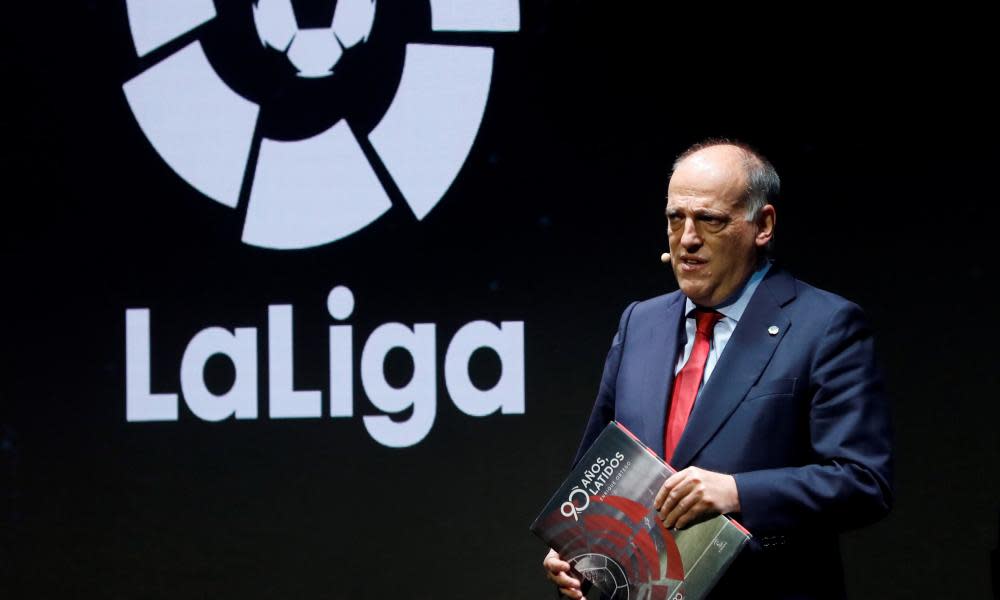La Liga president criticises Fifa and says richest clubs are ‘danger’ to game

The president of La Liga, Javier Tebas, was in London last week. Recently re-elected for a further four-year term, the controversial 57-year-old was in the capital for the launch of his TV channel, La Liga TV; but he had other things to say too, lots of them.
La Liga, like the Premier League, is in competition for global eyeballs. It wants to grow its audience around the globe and get them to spend more time watching Spanish football year on year. Hence the new TV station launching in the UK one year after the collapse of Eleven Sports. As an administrator, however, Tebas has other concerns; the one that plagues him most being the proliferation of football competitions, the most problematic of those being Fifa’s expanded Club World Cup, a 24-team competition set to be held in China in the summer of 2021.
Related: Pass masters Barcelona deliver first glimpse of the Setién manifesto | Sid Lowe
“Having been re-elected, I am very critical of the Club World Cup,” Tebas says. “An organisation like Fifa is supposed to be a regulatory body. They draft the different calendars and when we need to play. Sadly, from organising World Cups, they are now talking about Club World Cups and having that every two years. That is not an option because it would change the status quo. This can’t happen.
“A few weeks ago Fifa was talking about how much would be paid if they went to China. They have been talking about redistribution of revenue but haven’t discussed the impact this would have in different countries. Let’s imagine the two teams from Argentina [who will take part in the Club World Cup]. It’s 40 or 50m from a tournament such as this. This would have an impact on the Argentinian Super League. They haven’t looked at the consequences of these tournaments.”
The Club World Cup is not the only thing Tebas is critical of. His competition may be home to the two biggest clubs in world football, according to the latest Deloitte Money League, but Barcelona and Real Madrid are old money. The nouveau riche of Paris St-Germain and Manchester City are, meanwhile, a “danger” to the game, “state run… playthings” who “skew the balance of the entire European football structure.” This is what Tebas had said previously on the subject but in 2020 he takes a subtler line. “One of the major issues in European football is related to [financial] doping. Because when we have clubs being financed by states, then that has an impact on salaries,” he says, with everyone knowing whom he is talking about. “That means in other countries with more strict economic controls like Spain and Germany clubs cannot actually ask the state for extra financing to pay those salaries.
“Organisations and institutions have a responsibility to redistribute the wealth that we generate. All of us, the Spanish league, the Premier League, Uefa, Fifa. I don’t think we are helping football in any way if we generate wealth and it just goes straight back to the big clubs. In the end instead of having 12 Ferraris, they have 15. We’re dealing with major clubs generating a huge amount of money. So our aim is to redistribute that wealth.”
Tebas’s argument for greater largesse among football’s elite is new. Quite what the mechanism will be for it is unclear. He does, however, have positive noises for the Uefa chief executive, Alexander Ceferin, who has recently scaled back his own proposals for an expanded Champions League, in direct contrast to Gianni Infantino and Fifa. Perhaps he’ll look to do something with him.
Related: Transfer roundup: Real Madrid sign Flamengo playmaker Reinier Jesus
Tebas is deeply conservative in his personal beliefs and has even endorsed the new Spanish far right party, Vox. He does not want change in the European sporting ecosystem. This is not just ideological, of course; it suits the interests of La Liga. So does pushing out its own TV channel, and perhaps its own Over The Top online service (live football on an app) in due course.
“We’ve been working on the OTT now for several years”, says Tebas. “And the major advantage of OTT is knowing your users and their behaviour.
“We have an OTT right now with … 600,000 subscribers who watch everything from weightlifting to fencing. We’re analysing their behaviour … and how to influence them so they continue watching different sports with us. I don’t rule out the possibility of broadcasting football on that platform.” Which, in the world of scheming sport administrators, is about as close as you’ll get to a ‘yes’.


